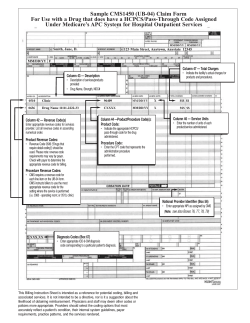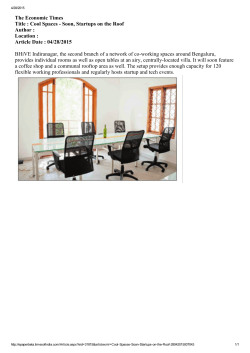
Metal Structures Design Project IV Steel hall
Metal Structures Design Project IV Steel hall View Doors - both ends; no column and girts across; calculation of inside pressure. Windows - no girts across. Structure Main frames - roof girders and main columns Continous purlins Suspension for purlins Housing - girts and columns Roof bracing Wall bracing Sum of sub-structures Algorithm Initial drawing Loads Purlins Suspension for purlins Housing Roof girder Main column Roof bracing Wall bracing Joints Drawing and list of materials Initial drawing Loads The same geometry and location as for II project → the same loads for roofing, snow and wind on roof Dead weight of roofing Dead weight of purlin Snow Wind on roof Wind on wall Inside pressure Dead weight of housing Dead weight of roof girder Dead weight of main column Dead weight of bracing and suspension Imperfections (procedure "A", #18 / 27) IInd order effect (procedure "A", #18 / 27) Imposed loads Thermal actions Exposed to fire Accidental actions Actions durin execution Purlins Cold-formed cross-section, continous beam with suspension. Exact calculations: 1993-1-3 Aproximation: I, II or III clas of crosssection, non-symmetrical cross-section Class of cross-section Shear resistance Bi-axial bending Deflections Main axes are not parallel and perpendicular to surface of roof → #7 / 35 "Normal" purlin - in both direction the same length → #7 / 36 Suspended purlin - addidtional support on y-direction. For x-z - the same length For x-y l1 = l / 2; Mmax ≈ 1 / 4 previous value; fmax ≈ 1 / 16 previous value; Housing columna and girts RHS Girts Class of cross-section Shear resistance Bi-axial bending Deflections Housing columns Class of cross-section Shear resistance Bending and axial force with flexural buckling Deflection I-beam column - interaction between flexural bucklin and lateral buckling RHS column - flexural buckling only Roof girder IPE, HEA, HEAA Class of cross-section Shear resistance Bending and axial force Interaction flexural buckling lateral buckling Deflection µy = µz = µLT = 1,0 Lcr, y = Lg Lcr, z = Lb Lcr, LT = max (Lb ; Lc) y - in plane; z - out of plane Resistance for bending and axial force - MEd i NEd for analysed cross-section. Interaction flexural buckling - lateral buckling - MEd i NEd max for analysed member, even if they are in different cross-sections. Main columns IPE, HEA, HEAA Class of cross-section Shear resistance Bending and axial force Interaction flexural buckling - lateral buckling Deflection µy → W. Bogucki, M. Żyburtowicz µz = µLT = 1,0 Lcr, y = Lcr, z = Lcr, LT = H y - in plane; z - out of plane Buckling length factor in-plane of frame "Tablice do projektowania konstrukcji metalowych", W. Bogucki, M. Żyburtowicz, Arkady, Warszawa 1984 Roof bracings ●L Prevention of flexural buckling and lateral buckling of girders; Wind pressure on front wall; Example 4 Horizontal upper transversal bracings I-beam girders Wind from this part acts on roof bracings (approximation) → #15 / 58 Wall bracings ●L Sway imperfection of columns Wind pressure on front wall Example 5 Vertical wall bracings F = Fwind + Fcolumn-imperf Wind from this part acts on left wall roof bracings Wind from this part acts on right wall roof bracings → #15 / 60 Joints purlin-purlin: rigid, bolted purlin-girder: hinge, bolted and welded girt - column: hinge, bolted girt - housing column: hinge, bolted housing column - girder: hinge, bolted base plate of housing column: hinge, bolted and welded roof bracing - girder: hinge, bolted and welded wall bracing - column: hinge, bolted and welded base plate of column: hinge, bolted and welded column - column: rigid, bolted girder - girder: rigid, bolted girder - girder (ridge): rigid, bolted and welded column - girder: rigid, bolted and welded Joint column-girder • Stiffeness of the joint • Welds between roof girder and end plate • Bolted joint girder - column; bedning moment • Bolted joint girder - column; shear force Stiffeness of the joint Calculations according to elastic model Rigid → #20 / 24 Semi-rigid Pinned EN 1993-1-8 fig 5.4 Example 3 Filled welds Welds between end-plate and girder or between base plate and column or between girder and column → #9 / 23 We should take into consideration no more than three rows of bolt in tensed part of node. Although it we should applied rows through whole high of beam for category E. → #12 / 32 1st row of bolts: Beam flange and beam web in compression (BFC) → #t / 6 Column web in transverse compression (CWC) → #t / 7 Column web in shear (CWS) → #t / 16 → #12 / 33 Column web in tension, 1st row (CWT1) → #t / 17 We analyse only bolt-row considered individually (i) (→ #11 / 75 ~ #11 / 77). We must analyse circular (c) and non-circular (nc) patterns (→ #11 / 73): CWT1-i-c, CWT1-i-nc Beam web in tension 1st row (BWT1) → #t / 17 There is no web, but this gusset plate will be treated as web. We analyse only bolt-row considered individually (i) (→ #11 / 75 ~ #11 / 77). We must analyse circular (c) and noncircular (nc) patterns (→ #11 / 73): BWT1-i-c, BWT1-i-nc 3rd row of bolts continuation: Resistance for third bolt-row: → #12 / 44 3BR = min [ BFC ; CWC ; CWS ; CWT3-i-c ; CWT3-i-nc ; ( CWT3-23g-c – 2RB ) ; ( CWT3-23g-nc – 2RB ) ; ( CWT3-123g-c – 1RB – 2RB ) ; ( CWT3-123g-nc – 1RB – 2RB ) ; BWT3-i-c ; BWT3-i-nc ; ( BWT3-23g-c – 2RB ) ; ( BWT3-23g-nc – 2RB) ; CFB3-i-c-1 ; CFB3-i-c-2 ; CFB3-i-c-3 ; CFB3-i-nc-1 ; CFB3-i-nc-2 ; CFB3-i-nc-3 ; ( CFB3-23g-c-1 – 2RB ) ; ( CFB3-23g-c-2 – 2RB ) ; ( CFB3-23g-c-3 – 2RB ) ; ( CFB3-23g-nc-1 – 2BR ) ; ( CFB3-23g-nc-2 – 2RB ) ; ( CFB3-23g-nc-3 – 2RB ) ; ( CFB3-123g-c-1 – 1RB – 2RB ) ; ( CFB3-123g-c-2 – 1RB – 2RB ) ; ( CFB3-123g-c-3 – 1RB – 2RB ) ; ( CFB3-123g-nc-1 – 1RB – 2RB ) ; ( CFB3-123g-nc-2 – 1RB – 2RB ) ; ( CFB3-123g-nc-3 – 1RB – 2RB ) ; EB2-i-c-1 ; EB2-i-c-2 ; EB2-i-c-3 ; EB2-i-nc-1 ; EB2-i-nc-2 ; EB2-i-nc-3 ; ( EB2-23g-c-1 – 2RB ) ; ( EB2-23g-c-2 – 2RB ) ; ( EB2-23g-c-3 – 2RB ) ; ( EB2-23g-nc-1 – 2RB ) ; ( EB2-23g-nc-2 – 2RB ) ; ( EB2-23g-nc-3 – 3RB )] Resistance of joint: → #12 / 45 Mj, Rd = 1RB · z1 + 2RB · z2 + 3RB · z3 Mj, Ed / Mj, Rd ≤ 1,0 Shear force – acts on bolts in compressed part of joint Thank you for attention © Tomasz Michałowski, PhD tmichal@usk.pk.edu.pl
© Copyright 2025









